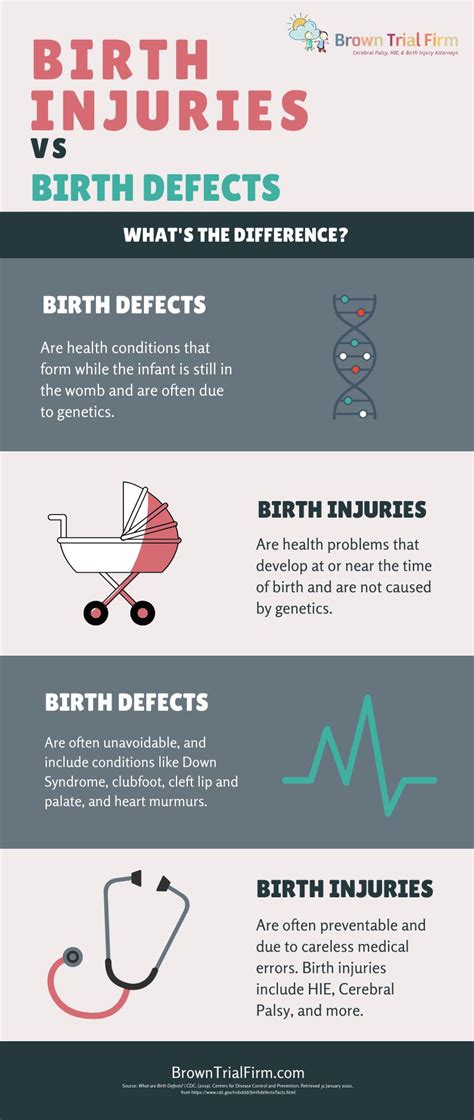
When it comes to birth complications, understanding the difference between a birth injury and a birth defect is crucial, especially when it comes to legal implications. Both can have significant impacts on the child and their family, but the causes and legal avenues for recourse differ. This article aims to clarify these differences and provide insights into the legal implications of birth injuries and birth defects.
What is a Birth Injury?
A birth injury refers to any harm or damage that occurs to a baby during the birthing process. These injuries are often the result of medical negligence or errors made by healthcare professionals during childbirth. Birth injuries can range from minor bruises and cuts to more severe conditions such as cerebral palsy, Erb’s palsy, or brain damage. They can be temporary or permanent, and the consequences can be devastating for both the child and their family.
What is a Birth Defect?
A birth defect, on the other hand, is a condition that develops before birth and is present at the time of delivery. It is usually caused by genetic factors, environmental factors, or a combination of both. Birth defects can affect any part of the body and can vary in severity. Common examples of birth defects include heart defects, cleft lip or palate, spina bifida, and Down syndrome. Unlike birth injuries, birth defects are not the result of medical negligence.
Legal Implications of Birth Injuries
When a birth injury occurs due to medical negligence, the family may have legal recourse. They can file a medical malpractice lawsuit against the healthcare provider or hospital responsible for the injury. To establish a birth injury case, the family must prove that the healthcare provider’s actions or lack of actions deviated from the standard of care, and that this deviation caused the injury. If successful, the family may be entitled to compensation for medical expenses, ongoing care, pain and suffering, and other damages.
Legal Implications of Birth Defects
Unlike birth injuries, birth defects typically do not involve legal action unless there is evidence of a preventable cause. In some cases, birth defects can be linked to exposure to harmful substances or medications during pregnancy, such as certain medications, chemicals, or infections. If it can be proven that a birth defect was caused by a specific medication or exposure, the family may have grounds for a lawsuit against the responsible party, such as a pharmaceutical company or employer.
Frequently Asked Questions
1. Can birth injuries be prevented?
While not all birth injuries can be prevented, many can be avoided with proper medical care and attention. Healthcare providers have a duty to provide a certain standard of care during childbirth, and any deviation from this standard can be considered negligence.
2. Are birth defects always genetic?
No, birth defects can have various causes, including genetic factors, environmental factors, or a combination of both. Genetic factors include inherited conditions or chromosomal abnormalities, while environmental factors can include exposure to toxins, infections, or certain medications during pregnancy.
3. How long do I have to file a birth injury lawsuit?
The statute of limitations for filing a birth injury lawsuit varies by state. It is important to consult with a medical malpractice attorney as soon as possible to understand your legal rights and the time limitations for filing a claim.
4. What types of compensation can be obtained in a birth injury lawsuit?
In a birth injury lawsuit, compensation can include medical expenses, ongoing care, therapy, assistive devices, pain and suffering, emotional distress, and loss of future earning capacity. The specific damages awarded will depend on the circumstances of the case.
5. Are birth defects more common than birth injuries?
Birth defects are generally more common than birth injuries. According to the Centers for Disease Control and Prevention (CDC), about 3% of babies in the United States are born with a major birth defect, while birth injuries occur in about 6-8 per 1,000 live births.
In conclusion, understanding the difference between birth injuries and birth defects is crucial for navigating the legal implications that may arise. While birth injuries can often be attributed to medical negligence and may lead to a medical malpractice lawsuit, birth defects are typically not a result of negligence and may require evidence of preventable causes for legal action. If you believe your child has suffered a birth injury or has a birth defect with a potential preventable cause, it is important to consult with a qualified attorney to discuss your options and protect your legal rights.